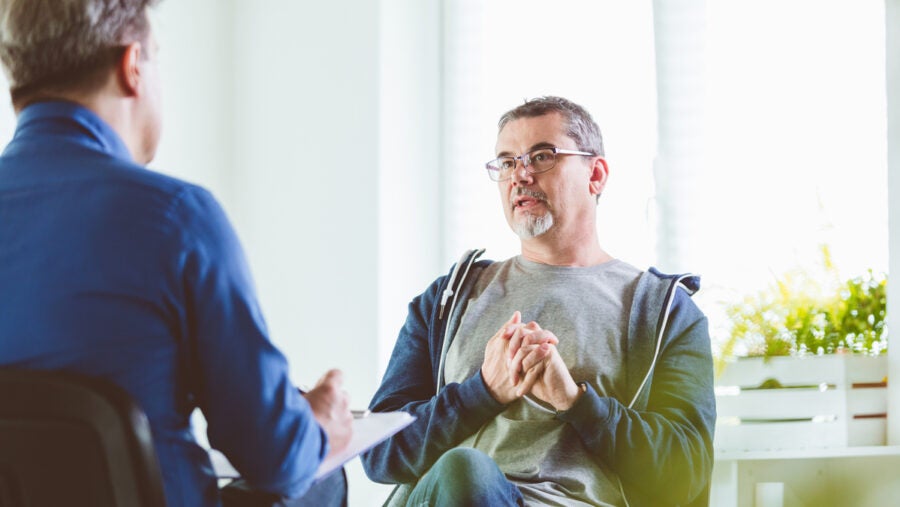
‘Patient choice’ has supplanted ‘doctor knows best’ as the new healthcare mantra. But how many men with prostate cancer are qualified to make an informed choice if they are advised: “You could have prostate removal or radiotherapy, or focal therapy or hormone therapy, or several together.”
Such decisions are critical because prostate cancer is the UK’s most common male cancer. Andrew Gabriel, 62, an independent patient-advocate, says: “Prostate cancer may be unique with its large number of treatment options, so the patient is left to decide. “This is ‘shared decision making’ whereby, notionally, you get the information you need in the clinic. But a clinician can’t cover everything in a 10 to 20 minute consultation.”
Hospitals provide written information, but there’s nothing better than talking to someone who’s had the treatment
As a patient advocate, Andrew spends between 60 and 90 minutes advising newly diagnosed patients. This may seem extraordinary, but Andrew, who was diagnosed with the disease six years ago, says: “There is so much to discuss, much of which clinicians do not routinely cover. Hospitals provide written information, but there’s nothing better than talking to someone who’s had the treatment and knows about its nuances.”
Hormone therapy is one example of this. A common prostate cancer treatment, hormone therapy blocks the male hormone testosterone and can cause fatigue, hot flushes, loss of muscle mass, breast swelling, loss of libido and the ability to get an erection.
Andrew says: “You’ll find plenty of men in support groups with experience dealing with such side effects. One thing I stress is that you cannot go for several years without an erection and expect it to still work when you finish treatment. “You need to preserve your erectile function while you’ve got no libido with erectile dysfunction medications.”
A safe place
Peter, a retired doctor, who became incontinent after undergoing prostate cancer surgery, joined a support group reluctantly after hospital staff suggested that it might help him.
He says: “I thought it would be full of whinging old men. Nothing could be further from the truth. What I found was a warm, easy space, with people talking freely — a world full of men with problems like mine. There were no taboo subjects. Feeling as if you are in a safe place is the key to a successful support group.”
Early diagnosis
Although Peter was a doctor, he ignored his symptoms for two years. He says: “I became angry with myself. I had delayed doing anything about it as I was convinced I had a benign (non-cancerous) disease.”
“Mercifully, it had not spread. Many men are similarly angry, not because they developed cancer but because they were refused a PSA test by their GP due to the fact they had no symptoms.”
A PSA test measures the amount of prostate-specific antigen (PSA) in the blood and can be the first step to diagnosing prostate cancer. Early prostate cancer rarely produces symptoms and by the time of diagnosis, it has spread beyond the prostate in 46% of men, making it harder to treat.
As a result, over 12,000 men die from prostate cancer in the UK each year. But caught early enough, prostate cancer can be curable. Peter stressed the urgent need for men to become aware of the risk of developing prostate cancer and see their doctor if they have concerns. The UK’s 100-plus prostate cancer support groups provide different options such as monthly meetings, one-to-one support and ‘walk-and-talks’.
To find your nearest support group, please visit tackleprostate.org/about-prostate-cancer/find-a-support-group

‘Patient choice’ has supplanted ‘doctor knows best’ as the new healthcare mantra. But how many men with prostate cancer are qualified to make an informed choice if they are advised: “You could have prostate removal or radiotherapy, or focal therapy or hormone therapy, or several together.”
Such decisions are critical because prostate cancer is the UK’s most common male cancer. Andrew Gabriel, 62, an independent patient-advocate, says: “Prostate cancer may be unique with its large number of treatment options, so the patient is left to decide. “This is ‘shared decision making’ whereby, notionally, you get the information you need in the clinic. But a clinician can’t cover everything in a 10 to 20 minute consultation.”
Hospitals provide written information, but there’s nothing better than talking to someone who’s had the treatment

